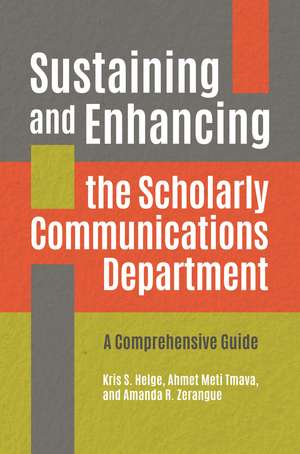Sustaining and Enhancing the Scholarly Communications Department: A Comprehensive Guide
Autor Kris S. Helge, Ahmet Meti Tmava, Amanda R. Zerangueen Limba Engleză Paperback – 10 noi 2019 – vârsta până la 17 ani
Preț: 361.10 lei
Preț vechi: 554.73 lei
-35% Nou
Puncte Express: 542
Preț estimativ în valută:
69.10€ • 72.32$ • 57.51£
69.10€ • 72.32$ • 57.51£
Carte tipărită la comandă
Livrare economică 31 martie-14 aprilie
Preluare comenzi: 021 569.72.76
Specificații
ISBN-13: 9781440866999
ISBN-10: 1440866996
Pagini: 180
Dimensiuni: 156 x 235 x 10 mm
Greutate: 0.3 kg
Editura: Bloomsbury Publishing
Colecția Libraries Unlimited
Locul publicării:New York, United States
ISBN-10: 1440866996
Pagini: 180
Dimensiuni: 156 x 235 x 10 mm
Greutate: 0.3 kg
Editura: Bloomsbury Publishing
Colecția Libraries Unlimited
Locul publicării:New York, United States
Caracteristici
Describes necessary technology for successful data management, e-journal publishing, and maintaining a scholarship repository
Notă biografică
Kris S. Helge is assistant dean of academic engagement at Texas Woman's University, Denton, TX. Ahmet Meti Tmava is assistant professor in the School of Library and Information Studies at the Texas Woman's University, where he teaches core courses and library assessment.Amanda R. Zerangue is manager of digital services and scholarly communication librarian at Texas Woman's University, Denton, TX.
Cuprins
IntroductionScholarly CommunicationOpen AccessAcademic LibrariesReferencesPart One Scholarly Communication and Open Access ConceptsChapter 1Copyright GuidanceThe Legal FrameworkExclusive Rights of the Copyright HolderExceptions to Exclusive RightsInfringement and RemediesOrphan WorksConclusionReferencesChapter 2Creative Commons LicensesOverviewFactors Contributing to the Popularity of Creative Commons LicensesCreative Commons LicensesProviding Guidance: Implications for Licensing under Creative CommonsImportance for LibrariesConclusionReferencesChapter 3Author RightsUnderstanding Your Author RightsNegotiating Your Publication AgreementConclusionReferencesChapter 4Open Access (OA) PublishingIntroduction to Open Access (OA) PublishingConclusionReferencesChapter 5The Challenges and Controversies of OA PublishingFaculty and Researchers' Awareness and Perceptions of OA RepositoriesFaculty Views and Participation Rates in OA RepositoriesFactors that Affect Faculty & Researchers' Participation in OA IRAdditional Individual Traits that Influence Faculty Participation in OA RepositoriesHindering Factors that Influence Faculty and Researchers' Participation in OA RepositoriesStatistically Significant Factors that Affect Faculty Participation in OA IRConclusionReferencesChapter 6Open Educational Resources (OER)OverviewDefining Open Educational ResourcesLocating Open Educational ResourcesBenefits to Using OER in the ClassroomFaculty Perspectives Regarding OERInitiatives to Scale OER on CampusOpportunities for Scholarly Communications DepartmentsConclusionReferencesPart Two Building a Scholarly Communications Department/TeamChapter 7Building and Maintaining a Scholarly Communications DepartmentIntroductionDefinition of Scholarly CommunicationsThe Possible Services of a Scholarly Communications DepartmentThe Appropriate Scale of a Scholarly Communications DepartmentTypes of Degrees Found in Scholarly Communications DepartmentsConclusionReferencesChapter 8Sustaining a Successful Scholarly Communications Department: Collaborating, Marketing, Managing, and InnovationIntroductionEstablishing a Relationship with the General Counsel's OfficeEffective and Encouraging Management is VitalA Work Environment Where Employees of a Scholarly Communications Department May Be Creative and FailCross-Pollination is VitalOffering Needed Services and ToolsLocating Blue Oceans: A Model That Helps Ensure Services and Tools Are Actually NeededManage/Lead as a ServantHow Burgeoning Technologies Will Affect Scholarly CommunicationsUniversal UsabilityConclusionReferencesPart Three Engaging the Campus CommunityChapter 9Connecting with the Campus Community by Providing Publication SupportLibraries as Journal Publishers and HostsProviding Funding to Support Research Publications in Open Access JournalsConclusionReferencesChapter 10Supporting Researchers with an Institutional RepositoryDefining Institutional RepositoriesDefining Data RepositoriesConclusionReferencesChapter 11The Future of Scholarly Communications: Where Are We Headed in Cultural Heritage Institutions?What Will Guide This Change?ConclusionReferencesRecommended ReadingsRecommended Web SitesIndex 161
Recenzii
Readers will be enriched and rewarded by this engaging book, which reads as a celebration of where we are as a discipline and hints at what we may yet achieve on our shared path.
